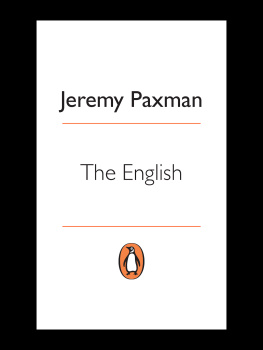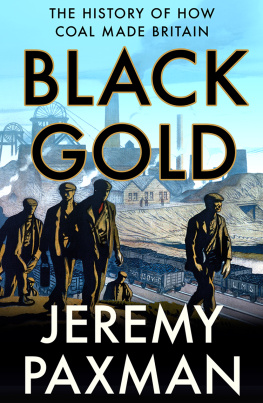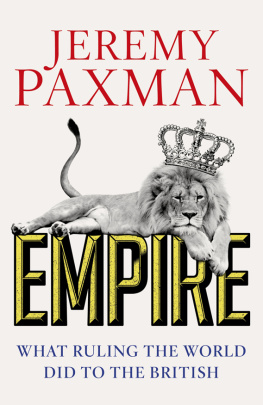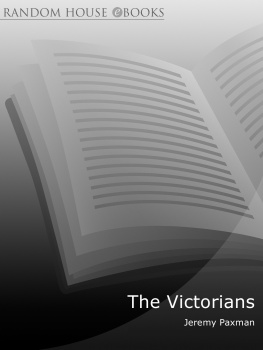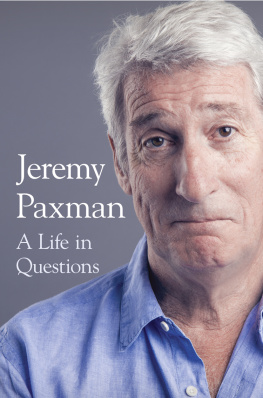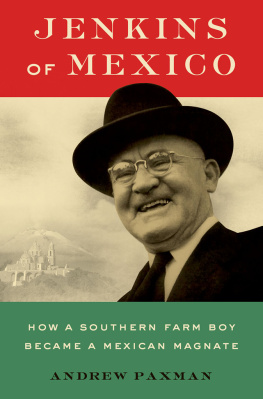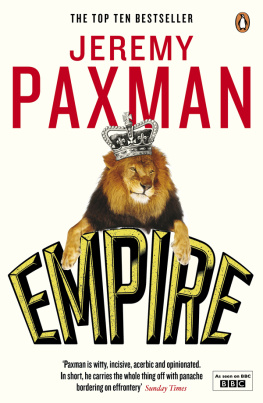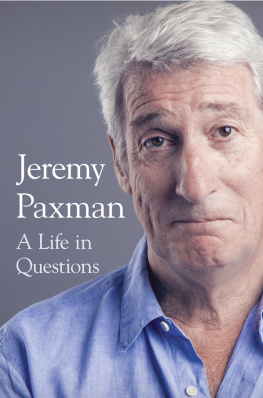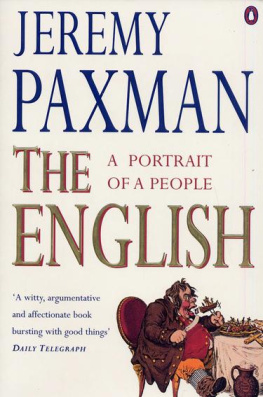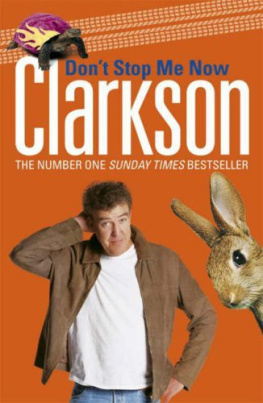PENGUIN BOOKS
THE ENGLISH
Compellingly readable Express
Engaging and perceptive Paxmans best ideas are not only illuminating but provoke further reflection Peter Clarke, The Times Literary Supplement
An astute guide to our peculiarities, ideals and pastimes from home-owning to spanking John Mortimer, Daily Mail
Paxmans portrait of a people has the direct rigour of his Newsnight probes He never lets himself or English history off the hook, and his perceptions are as sharp as his rebukes David Hughes, Mail on Sunday
His book is informative, stimulating and highly readable. A book to be widely discussed, enjoyed and argued over Margot Lawrence, Catholic Herald
ABOUT THE AUTHOR
Jeremy Paxman was born in Yorkshire and educated at Cambridge. He is an award-winning journalist who spent ten years reporting from overseas, notably for Panorama. He is the author of four books, all of which are published by Penguin: Friends in High Places: Who Runs Britain?, Fish, Fishing and the Meaning of Life, The English and The Political Animal. He is currently the presenter of Newsnight and University Challenge.
THE ENGLISH
A Portrait of a People
JEREMY PAXMAN

PENGUIN BOOKS
PENGUIN BOOKS
Published by the Penguin Group
Penguin Books Ltd, 80 Strand, London WC2R 0RL , England
Penguin Group (USA) Inc., 375 Hudson Street, New York, New York 10014, USA
Penguin Group (Canada), 90 Eglinton Avenue East, Suite 700, Toronto, Ontario, Canada M4P 2Y3 (a division of Pearson Penguin Canada Inc.)
Penguin Ireland, 25 St Stephens Green, Dublin 2, Ireland (a division of Penguin Books Ltd)
Penguin Group (Australia), 250 Camberwell Road, Camberwell, Victoria 3124, Australia (a division of Pearson Australia Group Pty Ltd)
Penguin Books India Pvt Ltd, 11 Community Centre, Panchsheel Park, New Delhi 110 017, India
Penguin Group (NZ), 67 Apollo Drive, Rosedale, North Shore 0632, New Zealand (a division of Pearson New Zealand Ltd)
Penguin Books (South Africa) (Pty) Ltd, 24 Sturdee Avenue, Rosebank, Johannesburg 2196, South Africa
Penguin Books Ltd, Registered Offices: 80 Strand, London, WC2R 0RL , England
www.penguin.com
First published by Michael Joseph 1998
Published with minor revisions in Penguin Books 1999
This edition published 2007
Copyright Jeremy Paxman, 1998, 1999
All rights reserved
The moral right of the author has been asserted
ISBN: 978-0-141-92239-3
For Jessica, Jack
and Victoria
PREFACE
Being English used to be so easy. They were one of the most easily identified peoples on earth, recognized by their language, their manners, their clothes and the fact that they drank tea by the bucketload.
It is all so much more complicated now. When, occasionally, we come across someone whose stiff upper lip, sensible shoes or tweedy manner identifies them as English, we react in amusement: the conventions that defined the English are dead and the countrys ambassadors are more likely to be singers or writers than diplomats or politicians.
The imperial English may have carried British passports as did the Scots, Welsh, and some of the Irish but they really didnt need to think too hard about whether being English was the same as being British: the terms were virtually interchangeable. Nowadays, nothing will so infuriate a Scot as to confuse the terms English and British, for Englands Celtic neighbours are increasingly for striking out on their own. Elections in May 1999 to the new Scottish parliament and Welsh Assembly were, predictably, trumpeted by the Labour party (which had invented the whole idea of devolved governments) as strengthening the Union. Perhaps so. But it is unquestionably changed. Scotland, at least, has always been a nation, with its own legal and educational system, and civic and intellectual tradition. Now it has its own government and it is hard to think of political institutions which, once given power, have not sought more of it. The language has begun to reflect this changed relationship. Where a year or two ago events in Scotland were talked of as regional, they are increasingly spoken about as national. The BBC has even issued instructions to its staff on the unacceptability of any longer talking of Wales as a Principality.
Then there is the problem of Europe. Who knows how the collective ambition or delusion that has gripped the European political lite will end up? If it is successful, a United States of Europe will make the United Kingdom redundant.
And then there is the corrosive awareness that neither Britain, nor any other nation, can singlehandedly control the tides of capital that determine whether individual citizens will eat or starve. Increasingly, the main business of national governments is the culture of their citizens.
These four elements the end of empire, the cracks opening in the so-called United Kingdom, the pressures for the English to plunge into Europe, and the uncontrollability of international business set me wondering. What did it mean to be English?
Although these are political questions, this is not a political book in the narrow sense of the word. I set out to try to discover the roots of the present English anxiety about themselves by travelling back into the past, to the things that created that instantly recognizable ideal Englishman and Englishwoman who carried the flag across the world. And then I tried to find out what had become of them.
Some of these influences were relatively easy to spot. Obviously the fact that they were born on an island rather than living on a continental landmass had had an effect. They came from a country where Protestant reformation had put the church firmly in its place. They had inherited a deep belief in individual liberty.
Others were more opaque. Why, for example, do the English seem to enjoy feeling so persecuted? What is behind the English obsession with games? How did they acquire their odd attitudes to sex and food? Where did they get their extraordinary capacity for hypocrisy?
I sought answers to the questions through travelling, talking and reading. Several years later, I am a bit the wiser and have a different set of questions.
And now I have just noticed that I am writing of the English as they, when I have always thought myself one of them. They remain elusive to the last.
CHAPTER ONE
THE LAND OF LOST CONTENT
Ask any man what nationality he would prefer to be, and ninety nine out of a hundred will tell you that they would prefer to be Englishmen.
CECIL RHODES
Once upon a time the English knew who they were. There was such a ready list of adjectives to hand. They were polite, unexcitable, reserved and had hot-water bottles instead of a sex life: how they reproduced was one of the mysteries of the western world. They were doers rather than thinkers, writers rather than painters, gardeners rather than cooks. They were class-bound, hidebound and incapable of expressing their emotions. They did their duty. Fortitude bordering on the incomprehensible was a byword: I have lost my leg, by God! exclaimed Lord Uxbridge, as shells exploded all over the battlefield. By God, and have you! replied the Duke of Wellington. A soldier lying mortally wounded in a flooded trench on the Somme was, so the myth went, likely to say only that he mustnt grumble. Their most prized possession was a sense of honour. They were steadfast and trustworthy. The word of an English gentleman was as good as a bond sealed in blood.
It is 1945. At last, the apparently endless war which has governed every waking moment of the British population is ended and they can relax. Everywhere in the industrial cities are gap-toothed mementoes of the Luftwaffe. In the towns that had survived relatively unscathed, the High Street is a jigsaw of different shop fronts, most of them little individual businesses, for this is, in Napoleons famously scathing condemnation, une nation de boutiquiers, a nation of shopkeepers. The vast retail chains which will within a few decades have driven the small tradesmen out of business are there, but if you dropped into the chain of Boots chemists, it might as easily have been to change your books at the library. In the evening, maybe a visit to the cinema.
Next page
